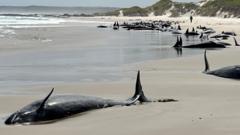As Tasmania grapples with a growing trend of whale strandings, the recent incident underscores both the fragility of these marine mammals and the difficulties encountered in rescue operations. A pod of 157 false killer whales stranded at Arthur River, with the remaining whales suffering extreme stress. Experts faced numerous obstacles, including harsh terrain and rough sea conditions, which hindered their attempts to return the stranded whales to deeper waters.
Despite the presence of some families within the pod, including calves, most of the whales died shortly after the stranding, prompting officials to make the heart-wrenching decision to euthanise the remaining survivors. Marine biologist Kris Carlyon noted that the site was the most challenging he had encountered in 16 years, as rescue efforts were hampered by difficult access routes.
Public attention turned to the site following a local resident's emotional report of encountering the distressed whales, visibly pleading for help. As the euthanasia operation was planned, concerns arose regarding the disposal of the carcasses because the area holds significant cultural value to the local Aboriginal community.
Tasmania has a troubling history with mass whale strandings, with over 80% of Australia's incidents occurring in the state. Scientists remain puzzled by this phenomenon, theorizing about potential causes ranging from individual disorientation to group stress responses. The situation highlights the need for ongoing research and advocacy for these highly social marine mammals as they navigate their survival in a changing environment.
Despite the presence of some families within the pod, including calves, most of the whales died shortly after the stranding, prompting officials to make the heart-wrenching decision to euthanise the remaining survivors. Marine biologist Kris Carlyon noted that the site was the most challenging he had encountered in 16 years, as rescue efforts were hampered by difficult access routes.
Public attention turned to the site following a local resident's emotional report of encountering the distressed whales, visibly pleading for help. As the euthanasia operation was planned, concerns arose regarding the disposal of the carcasses because the area holds significant cultural value to the local Aboriginal community.
Tasmania has a troubling history with mass whale strandings, with over 80% of Australia's incidents occurring in the state. Scientists remain puzzled by this phenomenon, theorizing about potential causes ranging from individual disorientation to group stress responses. The situation highlights the need for ongoing research and advocacy for these highly social marine mammals as they navigate their survival in a changing environment.



















